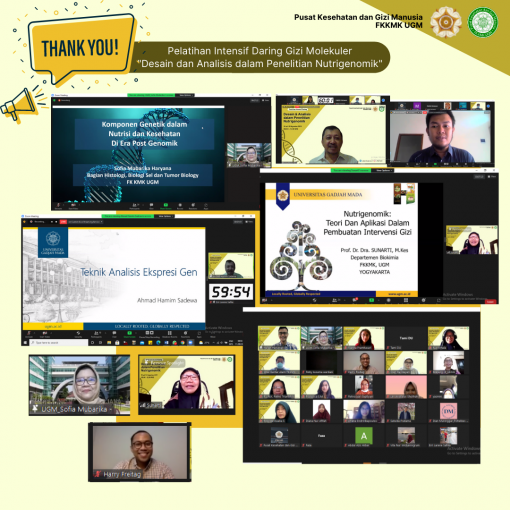
YOGYAKARTA– Center for Human Health and Nutrition (PKGM), FK-KMK, Universitas Gadjah Mada held an Intensive Online Molecular Nutrition Training “Design and Analysis in Nutrigenomic Research”. This activity will be held online from Tuesday, August 10, 2021 to Thursday, August 12, 2021, and is attended by 19 participants.
Nutrigenomics is a science that has developed a lot and is manifested in personalized dietary recommendations (personalized nutrition). Even so, the development of nutrigenomic science must also continue. One of the efforts that can be done is to continue to improve the quality of research related to nutrigenomics. The existence of research that is integrated with the latest design, technique, and analysis is expected to improve the quality of the development of nutrigenomic science. The existence of this training is expected to help researchers, nutritionists, dietitians, and other parties in understanding design and analysis in nutrigenomics research.
The activity was opened by the Chairman of PKGM, FK-KMK, Gadjah Mada University, Dr. Siti Helmyati, DCN., M.Kes. who conveyed the importance of collaboration in improving the quality of nutrigenomic research from various educational institutions in Indonesia. The agenda was continued with the presentation of material by the resource person, Prof. dr. Sofia Mubarika Haryana, M.Med.Sc, Ph.D, Prof. Dr. Sunarti, M.Kes, and Mr. Harry Freitag LM, S.Gz, M.Sc, RD. On the 2nd day, the material was delivered by dr. Ahmad Hamim Sadewa, Ph.D., and Mr. Rio Jati Kusuma, S.Gz, MS. Then on the 3rd day the training continued with the presentation of material and practice together with the training participants guided by Mr. Rio Jati Kusuma, S.Gz, MS.
The materials presented in this training include: 1) Introduction to genetic components; 2) Review the organization of the genome and chromosomes; 3) Nutrigenomics: Theory and application in making nutritional interventions; 4) Techniques in gene expression analysis; 5) Quantitative PCR Techniques in Nutrigenomics: Theory and application; 6) Quantitative PCR data analysis: Theory and application using R; 7) Analysis of Terminal Restriction Length Polymorphism: Theory and Application.
The trainees this time came from various universities in Indonesia as well as from hospitals. Even though it was conducted online, the enthusiasm of the participants was very high in listening to the material and doing joint practice on analytical techniques. The existence of this training is expected to increase enthusiasm for the academic community working in the field of molecular nutrition to continue to improve the quality of research and build more collaborations between educational institutions. [HH]
